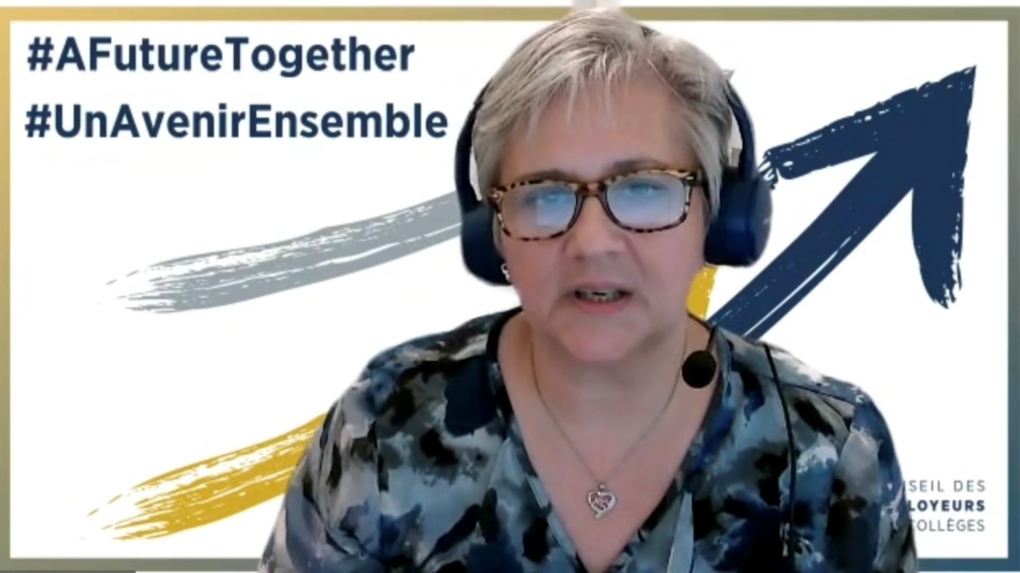Ontario college work-to-rule action 'Won't affect students at this point': Union
After months of negotiations and no contract for nearly three months, the Ontario College Faculty (OCF) has voted in favour of a strike mandate.
The OCF, which represents 15,000 college professors, counsellors, librarians and instructors, voted 59 per cent in favour of pursuing job action over the weekend.
"We're looking for a discussion on the substantive issues," says Darryl Bedford, president of OPSEU Local 110, the faculty at Fanshawe College.
"Issues such as contracting out, privatization of the system. Fanshawe has signed a deal with a private college in Toronto to take our materials and use them there to make a profit."
 OPSEU Local 110 President Darryl Bedford speaks on the phone in London, Ont. on Monday, Dec. 13, 2021. (Brent Lale / CTV News)
OPSEU Local 110 President Darryl Bedford speaks on the phone in London, Ont. on Monday, Dec. 13, 2021. (Brent Lale / CTV News)
The College Employer Council (CEC) says it's 'disappointed' in the results of the vote.
"I'm disappointed that the turnout was so low," says Dr. Laurie Raincourt, chair of the CEC management bargaining team.
"Since only 68 per cent of the bargaining unit voted, all we can tell for sure is that about 40 per cent of the bargaining unit has voiced their support for a strike."
 Dr. Laurie Raincourt, chair of the CEC bargaining team, speaks to CTV News London via Zoom on Monday, Dec. 13, 2021.
Dr. Laurie Raincourt, chair of the CEC bargaining team, speaks to CTV News London via Zoom on Monday, Dec. 13, 2021.
The union says it doesn’t intend to start with a full strike, but rather “an escalating work-to-rule and labour action campaign.”
"When it comes to teaching students, we aren't going to affect that," says Bedford. "There will be administrative things, things that the administration might be looking for us to do that we might not do. That's what we'll be starting off with."
With Bill 124 in place, which caps wage increases, the union isn't bargaining for more money this time. They are seeking greater security for faculty who are on partial-load contracts.
Monday, the CEC initiated the introduction of 10 terms and conditions of its recent proposal to improve working conditions for individual employees.
Those terms can be found here.
The union isn't satisfied. "It's unfortunate that the CEC wanted to just impose terms," says Bedford.
"What people do need to understand is that is just tearing up a previously signed agreement, and saying we're going to do whatever we want."
The CEC responded by saying they haven't stopped negotiations, and that 'none of the new introductions have a negative impact.'
Both sides claim they are willing to go to the bargaining table, but it seems as though they only want to negotiate their own terms. While the union says it's willing to go to binding arbitrartion, that's something that is of no interest to the CEC.
"We're committed to continuing to do everything we can to to achieve a collective agreement," says Raincourt.
"However what we can't do is is agree to those things that would put in jeopardy the sustainability of the system or would go against any current legislation. The form of arbitration that the union has has put on the table would leave the decisions of what ends up in the collective agreement to someone outside of the system."
OPSEU faculty will be providing the required five-day notice of labour action to the CEC and can begin work-to-rule, which will begin first with the union .ocals, as of December 18.
They claim a strike is the 'last option.'
"The ball is in the union's court at this point," says Raincourt.
CTVNews.ca Top Stories

Alberta RCMP officer charged with 2 counts of sexual assault
Const. Bridget Morla, a Leduc RCMP officer, has been charged with two counts of sexual assault in connection with an incident that happened two years ago.
Ontario dad removes hockey rink at heart of neighbour dispute
A Markham dad who drew the ire of neighbours and the city after installing a hockey rink in his backyard says the rink has now been taken down.
Motivated by obsession: Canadians accused in botched California murder plot in police custody
Two Canadians are in police custody in Monterey County, California, after a triple stabbing police say was motivated by a B.C. man's obsession with a woman he played video games with online.
Kingston, Ont. doctor in 'disbelief' after being ordered to repay $600K for pandemic vaccination payments
An Ontario health tribunal has ordered a Kingston, Ont. doctor to repay over $600,000 to the Ontario government for improperly billing thousands of COVID-19 vaccinations at the height of the pandemic.
More RCMP and CBSA ‘human resources’ destined for border, Public Safety Minister LeBlanc says
Public Safety Minister Dominic LeBlanc says the federal government will 'absolutely' be adding more Canadian Border Services Agency (CBSA) and RCMP ‘human resources’ at the border.
Belly fat linked to signs of Alzheimer’s 20 years before symptoms begin, study says
As the size of a person’s belly grows, the memory centre of their brain shrinks and beta amyloid and tau may appear — all of this occurring as early as a person’s 40s and 50s, well before any cognitive decline is apparent, according to new research.
Toronto Zoo shifts toward conservation, but critics want to eradicate animal captivity
The Toronto Zoo has been making a gradual, yet seismic shift towards prioritizing conservation and climate-change, focusing on breeding rare and endangered animals in the past few years. But critics say the zoo should focus all its resources on breeding animals for eventual release instead of keeping animals in captivity for display.
Trump demands immediate release of Oct. 7 hostages, says otherwise there will be 'HELL TO PAY'
President-elect Donald Trump is demanding the immediate release of the Israeli hostages still being held in Gaza, saying that if they are not freed before he is sworn into office there will be “HELL TO PAY."
AC/DC reveals 2025 North American tour. This Canadian city is the only one to make the cut
Big news for AC/DC fans as the heavy metal bigwigs announced Monday they will hit the road next spring. But as of now, there’s only one Canadian show on the docket.


































